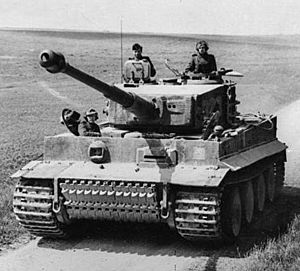Tiger I facts for kids
Quick facts for kids Panzerkampfwagen VI Tiger Ausf. E |
|
|---|---|

Tiger I in northern France, March 1944
|
|
| Type | Heavy tank |
| Place of origin | Nazi Germany |
| Service history | |
| In service | 1942–1945 |
| Wars | World War II |
| Production history | |
| Designer | Erwin Aders Henschel & Son |
| Designed | 1938–1941 |
| Manufacturer | Henschel |
| Unit cost | 250,700 ℛℳ |
| Produced | 1942–1944 |
| No. built | 1,347 |
| Specifications (RfRuK VK 4501H Ausf.E, Blatt: G-330) | |
| Mass | 54 tonnes (60 short tons) 57 tonnes (63 short tons) (Ausf. E) (Combat weight) |
| Length | 6.316 m (20 ft 8.7 in) 8.45 m (27 ft 9 in) gun forward |
| Width | 3.56 m (11 ft 8 in) |
| Height | 3.00 m (9 ft 10 in) |
| Crew | 5 (commander, gunner, loader, driver, radio operator) |
|
|
|
| Armour | 25–120 mm (0.98–4.72 in) |
|
Main
armament |
1× 8.8 cm KwK 36 L/56 92 AP and HE rounds |
|
Secondary
armament |
2× 7.92 mm MG 34 4,500 rounds 4,800 rounds (Ausf. E) |
| Engine | Maybach HL230 P45 V-12 700 PS (690 hp, 515 kW) |
| Power/weight | 13 PS (9.5 kW) / tonne |
| Transmission | Maybach Olvar Typ OG 40 12 16 (8 forward and 4 reverse) |
| Suspension | Torsion bar |
| Ground clearance | 0.47 m (1 ft 7 in) |
| Fuel capacity | 540 liters |
|
Operational
range |
Road: 195 km (121 mi) Cross country: 110 km (68 mi) |
| Maximum speed | 45.4 km/h (28.2 mph) on roads 20–25 km/h (12–16 mph) cross country |
The Tiger I was a powerful heavy tank used by Nazi Germany during World War II. It was first built in 1942 by the Henschel und Sohn company. This tank saw action in different parts of the war. These included the North African Campaign and Operation Barbarossa in Eastern Europe.
The Tiger I was known for its strong armor and powerful gun. It had about 100 mm (3.9 in) of armor. Its main weapon was an 8.8 cm KwK 36 gun. Many experts thought it was a very advanced design for its time.
About the Tiger I Tank
The Tiger I was a very expensive tank to build. It used a lot of special materials. Making it also took a lot of work and time.
Challenges and Weaknesses
Early versions of the Tiger I often had problems with their tracks. They could break down easily. The tank also used a lot of fuel, which meant it could not travel very far. It was also hard to move the tank over long distances.
The Tiger I did not move well in muddy, icy, or snowy areas. These conditions could cause its tracks to get stuck. Even though it was costly to keep running, its main parts were usually reliable.
Its Name and Legacy
The tank was given its nickname "Tiger" by Ferdinand Porsche. The full name for the first version was Panzerkampfwagen VI Ausführung H. The Roman numeral "I" was added later. This happened when the newer Tiger II tank was being made.
Today, only seven Tiger I tanks are still around. You can find them in museums and private collections. As of 2021, Tiger 131 is the only one that can still run. This tank was captured during the North Africa Campaign. It is now at The Tank Museum in the United Kingdom.
See Also
 In Spanish: Panzer VI Tiger para niños
In Spanish: Panzer VI Tiger para niños
 | Janet Taylor Pickett |
 | Synthia Saint James |
 | Howardena Pindell |
 | Faith Ringgold |

